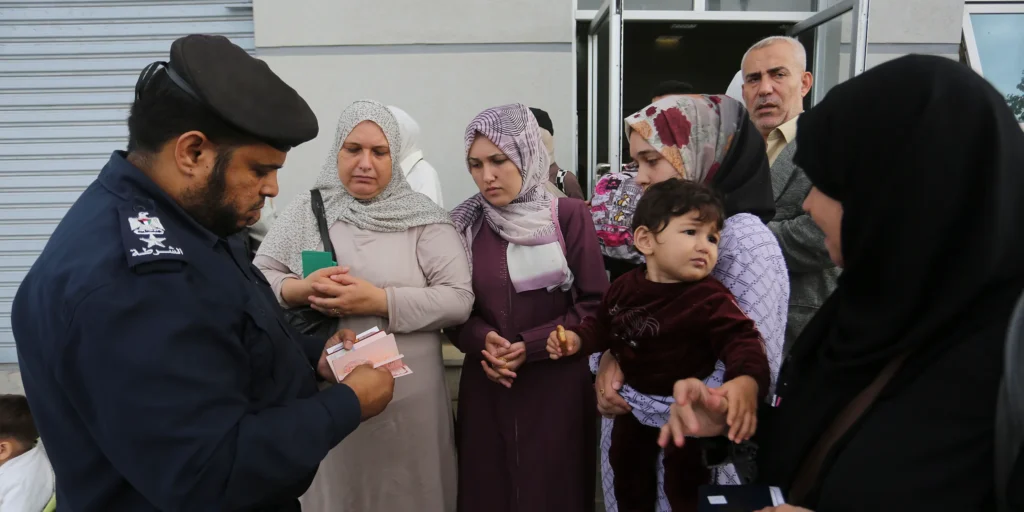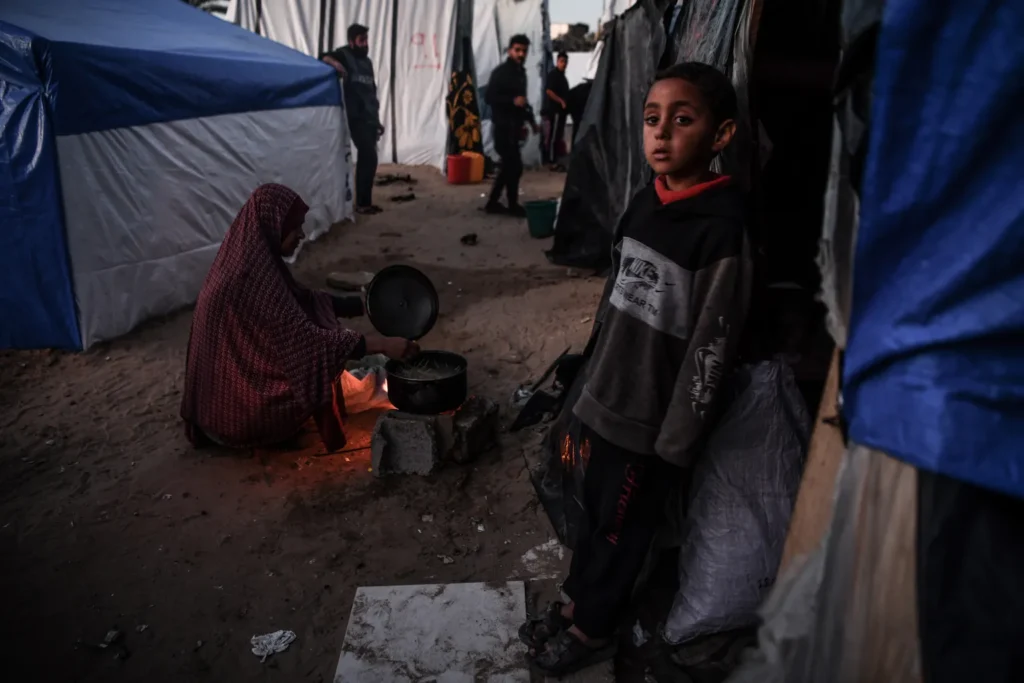In most cases, it takes having a foreign passport to be evacuated from Gaza into neighboring Egypt, though some people with serious injuries are sometimes allowed to exit as well. As Israel threatens to invade Rafah, where more than 1 million people from across Gaza have been displaced, Palestinians are increasingly desperate to get out. With no other options, they are turning to unofficial channels instead: paying what is known as a “coordination” fee for a travel permit. These days, that can cost $5,000 to $7,500 per person — an exorbitant markup of the prewar cost of $250 to $600.
Shatila’s family estimates that they need £30,000, or about $38,000, to pay the travel fees for six people. Having lost everything during the war, they don’t have anything close to that kind of money. So like many others in Gaza, they are now reluctantly raising funds online to support their escape.
“Even affording the basics now is beyond our means here,” said Shatila, whose sister urgently needs medical care after being injured in an airstrike. They launched a crowdfunding campaign, with the help of another sister who lives outside of Gaza — out of hopes that they can someday soon “sleep without fear or anxiety and wake up without the sound of warplanes and missiles,” Shatila said.
Palestinians who are able to scrape together the money pay the fees to a travel agency, which takes a commission before sending the remainder to officials in Egypt with connections to the state intelligence agency, according to people in Gaza with knowledge of the process. Within 10 days, the traveler’s name appears on a “coordination register,” separate from the official Gaza government register — allowing the traveler swift processing at the border. Mada Masr, an independent Egyptian news outlet, reported in a detailed investigation last month that a well-connected businessman with close ties to Egyptian President Abdel Fattah el-Sisi is running the show.
Officials in both Gaza and Egypt have denied the existence of a system to collect fees from would-be travelers. “We have nothing to do with imposing any fees on citizens for travel, and we listen to complaints, but we do not have any authority in this matter,” an official on the Hamas-controlled side of the crossing told Asharq Al-Awsat newspaper. An Egyptian intelligence official, meanwhile, asked Palestinians to “notify the Egyptian security authorities at the crossing if they are blackmailed or under pressure from anyone profiting from their case.”

It’s an open secret in Gaza that travel agencies coordinate with Egyptian authorities to buy passage for people seeking to leave the Gaza Strip. The process dates back to at least 2015, according to an employee of a Gaza travel agency, who spoke to The Intercept on condition of anonymity. By that point, Gaza had been under a punishing Israeli blockade that was reinforced by Egypt for nine years. The prolonged closure of the Rafah border crossing (which continues to this day) meant that people waited for months for government permission to leave the Gaza Strip, giving rise to coordinators who facilitated travel permissions for about $3,000, the travel agency source said.
The Hamas-run government has long officially opposed the practice, which is illegal, but it is commonplace nonetheless. “The government used to require some travel agencies that had worked in coordination, to sign an agreement stating that if they were caught breaking the rules again, their business would be shut down,” the employee said. “Then the government turned a blind eye.”
For Gazan youth who face travel restrictions to Egypt, paying the fee has long been one of the only ways out: a path to medical treatment, an education, or better economic opportunities abroad. The coordination fee has fluctuated over time, generally more expensive in the summer than during winter months. In the months preceding the current war, the fee was around $250 to $600, according to the worker and Palestinians who paid such fees last summer.
“The Egyptian side determines the coordination fees, but sometimes Gazan coordinators manipulate prices,” the worker said. He added that the local fixers send the money to Egyptian officials through a currency exchange office in Gaza or another cash transfer service.
For the Egyptian public and others sympathetic with the people of Gaza, the idea of Egyptian officials pocketing thousands of dollars in coordination fees is unforgivable.
As those prices have skyrocketed in recent months, and as fundraisers for Palestinians hoping to cross into Egypt have proliferated online, the Egyptian government has faced increased scrutiny for its management of the border crossing. Keeping the border closed and ceding to Israeli restrictions on humanitarian aid is controversial enough; for the Egyptian public and others across the Muslim-majority world who are strongly sympathetic with the people of Gaza, the idea of Egyptian officials pocketing thousands of dollars in coordination fees is unforgivable. The Egyptian government, for its part, has continually denied that such an arrangement exists.
Yet a retired security source who used to work with Egypt’s military intelligence in North Sinai, a province that is near the border with Gaza, confirmed to Middle East Eye that there is a network of mediators connected to different parts of the state’s security apparatus who were facilitating the entrance of foreigners from Egypt’s eastern borders.
In its recent investigation, Mada Masr reported that a travel agency called Hala Consulting and Tourism Services, owned by Ibrahim al-Argany, has usurped control of the coordination process, effectively becoming the only agency capable of ensuring travel permits. Human Rights Watch scrutinized Argany’s dealings back in 2022, reporting that Hala “has strong links with Egypt’s security establishment and is staffed largely by former Egyptian military officers.”
In a recent post, a Facebook page affiliated with the travel agency advertised prices of $5,000 for adults and $2,500 for those younger than 16.
“Hala agency’s offices in Cairo are overcrowded,” Asil, a Palestinian woman who recently paid $24,000 for her family’s travel, told The Intercept. “They are willing to pay any amount to get their families out of Gaza.”
Two-thirds of people in Gaza have been displaced since the start of the war. Most of them, some 1.3 million, are now caught in Rafah, a city in southern Gaza that Israel had declared a safe zone.
The Shatila family’s displacement journey began in the first week of the war. Residents of Gaza City, they had moved south to Rafah to shelter at a relative’s house. On October 17, they were sleeping when an Israeli air raid struck an adjoining house, wounding all of Shatila’s siblings and father.
“Suddenly, the house roof fell on us, and a large stone struck my head. I was bleeding from my head and nose, vomiting blood. We were screaming for rescue,” Shatila said. “I didn’t find my eyeglasses and couldn’t see anything to look for my family. I was screaming and calling my family, but I didn’t find them.”
Nearly three months after launching the fundraising campaign, the family is still stuck in Gaza, having raised just over half the money they need for the six of them to leave the country.
“I know we may not raise the whole amount as it’s very high, hoping it goes down soon,” she said.
Hana Khater, another Gaza resident whose family was displaced by Israeli bombings, fled to Egypt after paying $6,000 per person. Asking to be identified by a pseudonym for safety reasons, she said she and her family took shelter in Khan Younis when the war erupted. A week later, the city came under intense bombing.
“All of a sudden, a huge missile hit a neighboring building. Stones and windows fell on us,” she said. Everyone inside was injured, and her mom took a particularly hard hit to the back. Their faces were covered in dust, their clothes torn as they screamed for help. “The scary blaring sirens of ambulances added to the chaos.”
After the attack, they took shelter in an office where they had little access to food or clean drinking water.
“The polluted water and food made me sick, but we didn’t have any choice,” Khater recounted. “We used to eat one meal to save food. We couldn’t take a shower or wash our clothes daily. Then things got worse and worse.”
“It is unbelievable to pay $36,000 to travel.”
Since October 7, her family had debated whether to leave Gaza. Her father was opposed at first, fearing another Nakba, or catastrophe, an Arabic word that is commonly used to describe the events of 1948, when armed Zionist militias forcibly expelled 750,000 Palestinians from their lands and established the state of Israel.
By early December, they made up their minds. On December 5, they paid the fees, and five days later, the six of them exited the strip through the Rafah crossing.
“It is unbelievable to pay $36,000 to travel. One has to sell all his belongings to pay for coordination,” Khater said.
The Egyptian government is obligated to evacuate its citizens from Gaza, but some have been unable to get out through official channels and turned to coordination instead. The fees for them are considerably lower than those imposed on Palestinians: $1,200 per person, according to one Egyptian national who has gone this route.
Yasmine Khaled, a Palestinian from Gaza who asked to be identified by a pseudonym, tried to travel to Egypt on October 10 with her family, as her mother is Egyptian. As they waited in Rafah for a bus to cross into Egypt, travelers were instructed to seek shelter as Israel was preparing to bomb the crossing.
“They bombed the crossing with three missiles. There wasn’t any place to hide. You can’t imagine the crying and horrors. The situation was very difficult. Then we were told to stay until the next day to travel. We stayed awake in the crossings,” Khaled told The Intercept.
Her family, along with hundreds of other people, were prevented from crossing by Egypt and had to go back to Gaza. They moved from shelter to shelter four times before finding somewhere to settle, an overcrowded house in Khan Younis, where several U.N. employees were residing with their families.
“There were around 80 people, including infants and children, in the house. We didn’t have water for most of the time and we had to line up to use the bathroom,” she recalled.
Desperate to leave, and unable to afford exorbitant coordination fees, they reached out to officials in the West Bank and Egypt for help evacuating. Those efforts went nowhere, but they eventually learned that there was a separate coordination process for Egyptians and their families in Gaza. Ten days after applying, they traveled to Egypt. Khaled’s dad and her brother were denied entry at the time, she said, but paid $10,000 in mid-February and eventually made it to Egypt.
Both Khaled and Khater said that the traumas of the war have traveled with them to Egypt.
When Khater hears an airplane overhead, her instinct is to anticipate a bombing. “I doubt we can fully recover from our fears,” said Khater, who is now trying to learn German so she can travel to Germany for grad school. Khaled, for her part, said she is constantly thinking about those they left behind in Gaza, as well as the uncertainty of what will happen when their tourist visa expires.
“My nephews and nieces become frightened when they hear the sounds of planes,” she said. “We have no plans for the future. It’s completely vague. I don’t know what we’ll do after our 45-day stay here, or what I’ll do with my job. We have a lot to be concerned about.”

